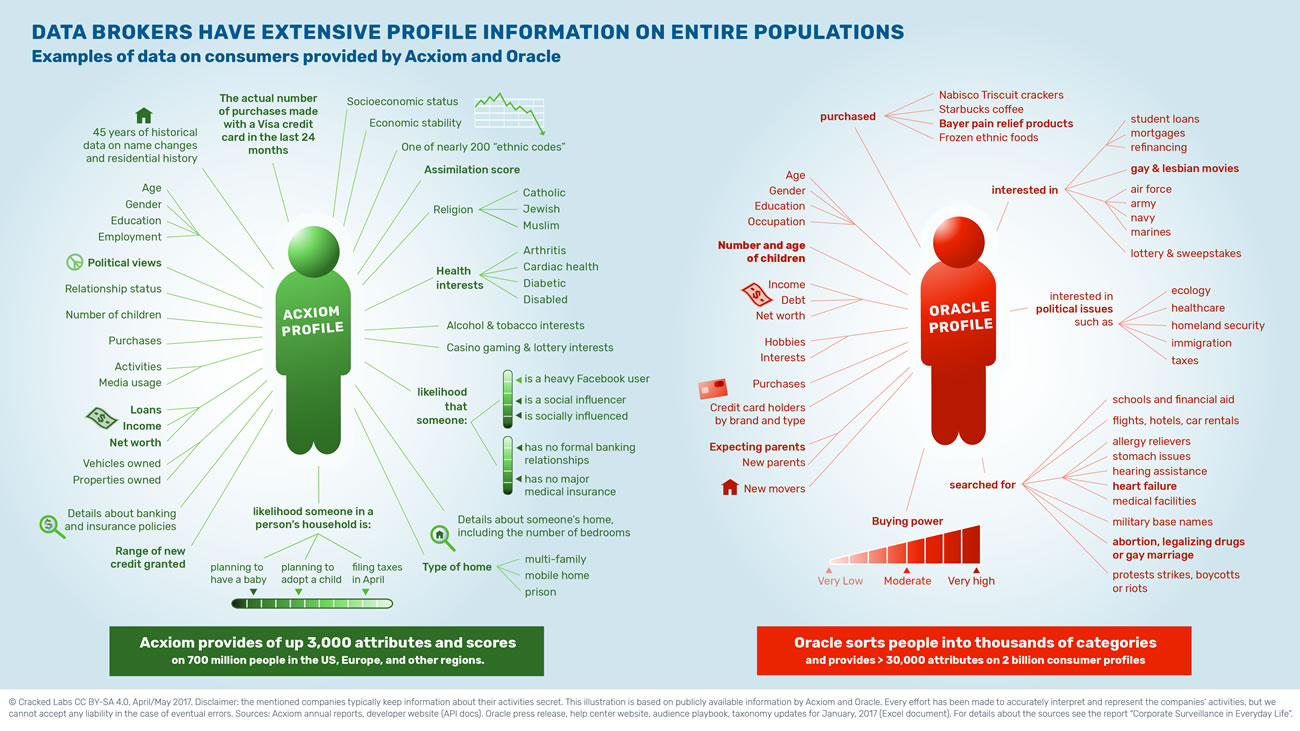What if I told you there is an entire industry of companies called data brokers that collect, buy, sell, and trade your information behind the scenes, and you’ve probably never heard of most of them. Most people think of companies like Google and Facebook as the biggest electronic spies, but other, more secretive companies track more about you than you think. You might even be shocked at the information they know about you.
If you’re a typical American, there are a lot of things that data brokers collect that you probably didn’t realize. Of course they know the basics like your name, age, address, phone number, email, gender, and social security number. They also know who you’re related to, where you’ve lived in the past, property you own, and details of your criminal record if you have one.
Want a fun party trick to freak out your friends? Go to whitepages (dot) com (I recommend using a private/incognito browser window) and search on a name & city and see what you can find out before you even pay them any money (and please don’t). Try putting in the name of a friend, a parent, a loved one.
My mother passed away last year. In less than two weeks, I started getting mail from creepy estate brokers offering to help me with the property I “inherited.” Fortunately my father is still alive so there’s nothing to inherit, but these marketers are relentless. I don’t even live that close to my parents. And I’m a very privacy-savvy person, but it took nothing for these unscrupulous trolls to buy the information to find me based only on an obituary.
And it doesn’t end there. Data brokers have your paychecks. They have your photos – and can use them to recognize you in any other photo. They get your loyalty card purchases. They know when & where you shop with credit/debit cards and what you bought. I was in a sales meeting a couple years back when one of these vendors pitched that they could accurately predict (~75% of the time if I recall) on which day a given person would likely need to fill their car’s gas tank.
They know your location – not just now, but everywhere that you have taken your phone with you. And they’re not just tracking apps on your phone, they’re scanning your license plate as you drive around town and throughout the country. Have a Smart TV (like the ones with built-in Netflix)? Over 10 million TVs have software embedded which can upload second-by-second data on what you’re viewing.
There are hundreds of data brokers. And when you combine the data from several of them, it gets even scarier. Look at this diagram of what you could determine about a person by combining data from Acxiom (one of the biggest data brokers) and Oracle (a major collector of shopping and browsing data):
So what can you do about it? In the United States you don’t have consumer protections for most of this. Data brokers are very careful to skirt the edges of existing regulations (such as those for credit reporting agencies). If you live in California, there is legislation called CCPA that gives you some protections, but even still, it’s not easy finding all of the companies that have your data.
And this is only likely to get worse. We’re only now starting to understand the value of other types of information. Have you used a DNA matching service like 23andMe or AncestryDNA? Sure, it might sound fun to find out if you are a descendant of people from Norway or Sri Lanka, or related to Napoleon or Genghis Khan. But you’re giving away valuable information (actually, you’re paying them to take it). And these companies are already selling your information too. Do you really understand your rights about how your genetic data can be used? What if they get hacked? Will future employers, insurers, or loan officers be able to buy important information about you based on your gene sequences? Today that gives information about race, gender, hair/eye color, and a number of genetic disorders. What if we learn how to read genes to determine your inherent cognitive ability/IQ, your sexual orientation, or predict your approximate age of natural death? How will the people that buy that information use it? Can you still get a 30 year mortgage if the bank can buy information that says you might only survive another 20 years? Do you trust our lawmakers to protect us?
Collection of other biometric data is just as scary. Fingerprints, eye/iris scans, palm prints, facial recognition – these are things being used (often voluntarily) for people to access phones, doors, shopping cards, etc. How can those be used in the future, and what protections do you have? (Answer: little to none.) Governments in parts of the world are already using gait detection – systems that can uniquely identify you from a video camera just by watching the physics of how you walk. Suddenly those scenes from Minority Report with Tom Cruise walking down the street with personal ads tracking him everywhere don’t seem so futuristic. That future is almost here.
There are a few things you can do to help. First, wherever possible, don’t give anyone your information if you don’t have to. Turn off or opt out of data collection when you can (e.g. your Smart TV). Some data brokers allow you to opt-out and/or delete your data, here’s a site with some options. There are even services that offer to do it for you as a paid service (disclaimer: I’ve never used them and know nothing about them).
Our biggest hope lies in getting our lawmakers to address this. Europe has passed their GDPR legislation which gives European citizens a lot more protection in areas like these. So far American lawmakers (outside of California, at least) have done very little to protect the privacy rights of their constituents from data brokers.
Cover Image Credit: Andrea Piacquadio

